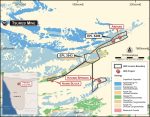The 8th Windhoek Mayoral Business Forum (WMBF) has set in motion an ambitious plan to transform the city’s approach to urban agriculture, with Mayor Ndeshihafela Larandja outlining a comprehensive strategy to tackle food insecurity, water scarcity, and economic inequality. Held at the Namibian Institute of Public Administration and Management (NIPAM) on June 25, 2025, the forum brought together government officials, private sector leaders, agricultural experts, and community stakeholders to chart a sustainable path forward for urban farming in Namibia’s capital.
Central to the discussions was the urgent need to reform policies and practices to support urban agriculture. Mayor Larandja emphasized that the current legal framework, particularly the Local Authorities Act 23 of 1992, must evolve to formally recognize and facilitate urban farming. “Without legal recognition, urban farmers face unnecessary barriers, from land access to funding,” she stated. The mayor pledged to prioritize lobbying for policy changes that would integrate urban agriculture into Windhoek’s food security and economic development strategies, ensuring it becomes a pillar of resilience for the city’s growing population.
Water scarcity emerged as a critical challenge, with Windhoek’s arid climate demanding innovative solutions. The forum highlighted the potential of technologies like drip irrigation, rainwater harvesting, and greywater recycling to revolutionize water use in urban farming. Mayor Larandja clarified misconceptions about rainwater harvesting, confirming that household and community storage systems are not discouraged by the City Council. Instead, the council plans to provide targeted support for tank installations and collaborate with institutions like AgriBank and the Ministry of Agriculture to promote water-efficient systems for small-scale farmers. These measures aim to empower residents to grow food sustainably, even in the face of limited water resources.
Capacity building was another key focus, with the mayor stressing the importance of equipping urban farmers with the skills needed to thrive. Training programs in sustainable practices, financial literacy, and climate-resilient crop cultivation will be expanded through partnerships with the University of Namibia, AgriBank, and local training institutions. The City’s Farm Okukuna will serve as a hub for hands-on learning, ensuring farmers can adopt environmentally friendly techniques like composting and pest management. “Knowledge is power,” Mayor Larandja remarked, underscoring the role of education in fostering a new generation of urban farmers.
Financial inclusion also took center stage, as many small-scale farmers struggle to access funding. The forum called for revised loan requirements from institutions like AgriBank to accommodate micro-farmers, along with grants and subsidies for women, youth, and marginalized groups. These financial interventions, developed in collaboration with the Khomas Regional Council and central government, aim to break down barriers and create opportunities for aspiring urban farmers to start or expand their operations.
The mayor outlined a clear action plan to translate these discussions into tangible progress. In the short term, the City of Windhoek will finalize the Windhoek Urban Food Systems Strategy by November 2025 and identify underutilized land for community gardens and small-scale commercial farming by October 2025. A multi-sector Urban Agriculture Task Force, led by the City’s Department of Economic Development and Community Services, will be established to oversee these initiatives and ensure coordinated efforts across stakeholders. Additionally, partnerships with the Namibia Agronomic Board will streamline market access for urban farmers, with free spaces allocated at the City’s month-end markets to connect producers directly with consumers.
A highlight of the forum was the announcement of Mayor Larandja’s legacy project, the “Windhoek Grows Campaign,” set to launch in July 2025. This city-wide initiative will promote household backyard gardening through training, community outreach, and demonstration gardens. With technical support from the Ministry of Agriculture and the University of Namibia, the project aims to train 200 to 300 residents in composting, water-efficient irrigation, and crop selection. The mayor also plans to recognize outstanding urban farmers with quarterly certificates, fostering a culture of innovation and sustainability.
The campaign addresses a pressing need in Windhoek, where rising food prices and limited access to fresh produce have made household food self-sufficiency more important than ever. By converting underutilized spaces into productive gardens, residents can improve their nutrition, reduce food costs, and even generate income through produce sales. “Urban agriculture is not a hobby—it is a lifeline,” Mayor Larandja said, echoing the words of Shirley Mambadzo, a participant at the earlier Agricultural Forum.
The forum concluded with a call to action for all stakeholders to collaborate in building a resilient urban agriculture ecosystem. Mayor Larandja urged attendees to propose practical amendments to laws and policies that would support this vision. “The future of Windhoek’s food security rests in our hands,” she declared. “Together, we must cultivate it.”
As Windhoek moves forward with these initiatives, the city is poised to become a model for sustainable urban farming in arid regions. By addressing policy gaps, leveraging technology, and empowering communities, the WMBF has laid the groundwork for a future where fresh, locally grown food is accessible to all. For residents, the message is clear: the seeds of change have been planted, and with collective effort, Windhoek will reap the harvest of a greener, more food-secure tomorrow.










